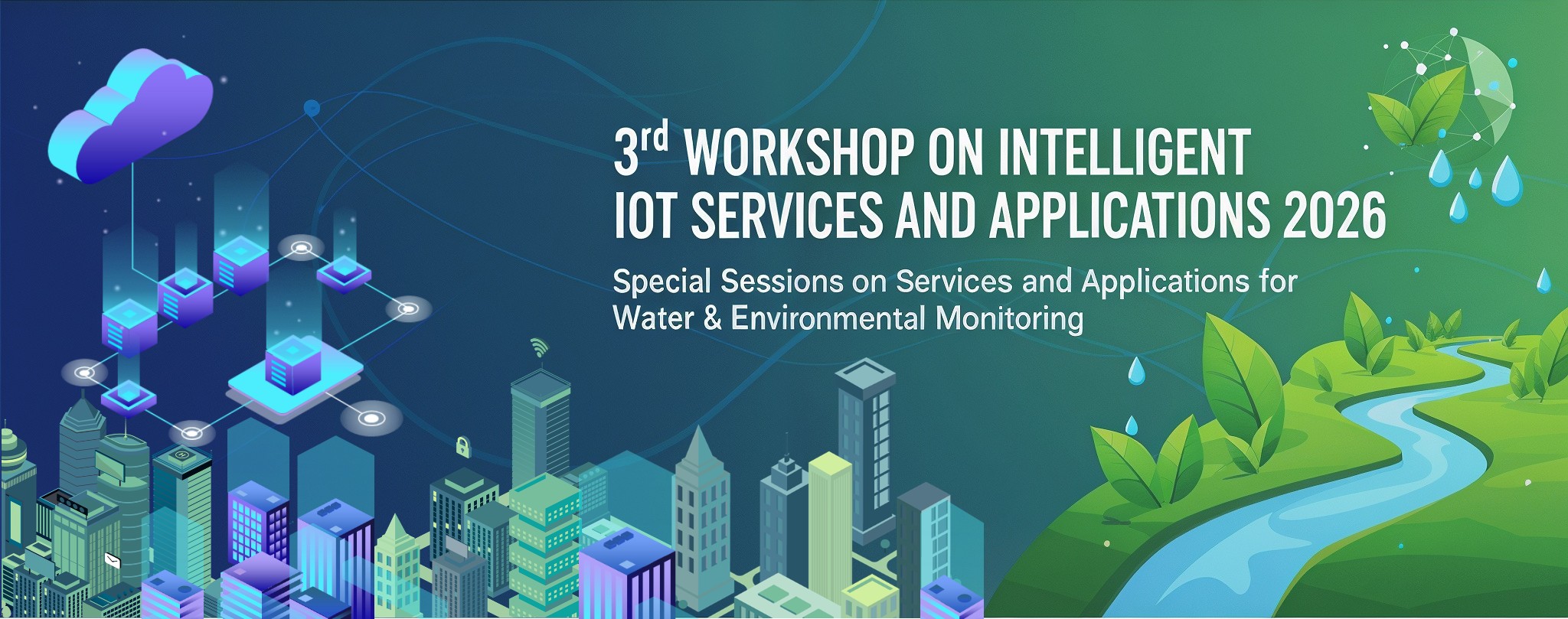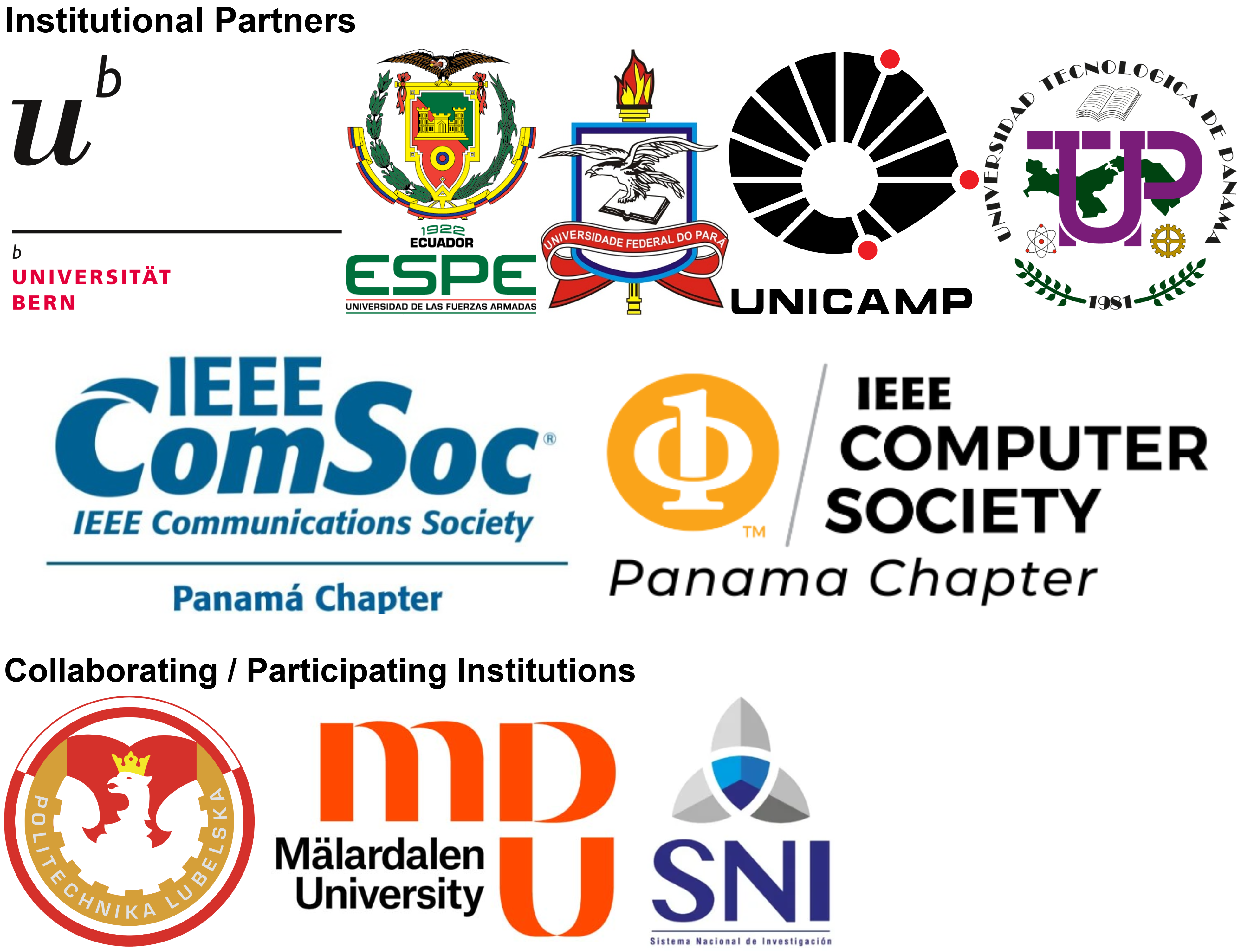3rd Workshop on Intelligent IoT Services and Applications 2026
Special Sessions on Services and Applications for Water & Environmental Monitoring
February 2-4, 2026



Location
Universidad Tecnológica de Panamá, UTP, Panama City (rooms to be defined)
Call for Workshop Contributions
The 3rd Workshop on Intelligent IoT Services and Applications invites contributions at the intersection of the Internet of Things (IoT), Artificial Intelligence (AI), and Machine Learning (ML). We are interested in intelligent, adaptive, and resource-efficient systems that leverage sensing, communications, data analytics, and automation to deliver measurable impact across domains such as environmental and water monitoring, smart buildings and campuses, healthcare and assisted living, smart grids and metering, mobility and connected transportation, agriculture, and industrial IoT.
With advances in edge AI, federated and distributed learning (e.g., Federated Learning, Split Learning, Gossip Learning), and cloud–edge orchestration, IoT systems can process data close to the source, reduce latency and bandwidth costs, and preserve privacy while scaling to large deployments. IoT ecosystems integrate heterogeneous physical devices and virtual components (software, data, services) to enable advanced computational capabilities. Complementary communication technologies from LPWAN (e.g., LoRaWAN/Helium) to 5G and beyond, and robust data pipelines (stream processing, MLOps) enable reliable, low-power, and secure operation in real-world conditions.
This third edition highlights Special Sessions on Services and Applications for Water and Environmental Monitoring, building on results from the Fog2 initiative and the workshops held in 2023 and 2025 at the Universidad Tecnológica de Panama. The 2026 hybrid event will bring together an international community from Europe and Latin America, connecting universities, small and medium-sized enterprises, public agencies, and user groups to showcase project results and follow-on activities and to explore new application areas that combine the IoT with ML and AI. The workshop aims to broaden participation beyond academia and translate contributions into real-world impact by emphasizing practical implementations, interoperability, and reproducibility.
Objectives
- Convene the international community to exchange advances in intelligent IoT systems, with an emphasis on water and environmental monitoring within a broad, open call.
- Showcase real-world deployments (Latin America & Europe), including LoRaWAN/Helium connectivity, edge/federated learning, and digital-twin workflows.
- Collaborations among academia, industry, public agencies, and user groups, aiming at replicable, sustainable solutions with societal impact.
- Disseminate open materials (slides, recordings) to support training and technology transfer.
Topics of Interest (include but are not limited to)
- IoT for water and environmental monitoring
- IoT technologies and Innovative Applications
- Practical IoT deployments and experimental insights
- Industrial IoT systems
- Edge AI/ML on resource-constrained devices
- Distributed ML methodologies
- Cloud/Edge architectures, stream processing, and MLOps for IoT
- Cyber-Physical Systems (CPS) and industrial IoT
- Security & privacy for IoT/edge/cloud
- Digital twins for assets, buildings, cities, and environmental/water systems
- Communication technologies: 5G & beyond with native AI
- Programming paradigms for intelligent IoT apps and systems
- Energy efficiency and sustainability of IoT deployments
- Vehicular IoT and connected/autonomic transportation
- Blockchain for IoT data integrity and marketplaces
- Smart metering and utilities
Special Focus: Water & Environmental Monitoring
- Hydrological and water-quality sensing
- Urban microclimate & heat-island monitoring; air/soil quality
- Early warning systems
- Digital twins for catchments, distribution networks, and treatment plants
- Low-power wide-area networking (e.g., LoRaWAN/Helium) and robust data pipelines
- Edge/federated learning for anomaly detection, forecasting, and control
- Governance, ethics, privacy, and long-term maintenance of sensor networks
Contribution Types
- Keynote talks
- Research presentations (approx. 30 minutes, including Q&A)
- Posters & Demos (interactive sessions)
- Tutorials (max. 1/2 day)
- Hands-on exercises or hackathons (1/2 -1 day)
- Panel discussions
Workshop format
- Hybrid format: In-person and virtual participation.
- Remote participation will be enabled via Microsoft Teams.
- The official workshop language is English.
Target Audience
- Researchers, professors, and practitioners from academia and industry (including SMEs), as well as engineers/technicians from utilities and environmental agencies
- Students at all levels (Bachelor, Master, PhD)
- Decision makers from public administration and industry
Participation & Registration
- Proposals for contributions: submit your contribution via Microsoft Forms
- Attendee registration (without contribution): via Microsoft Forms
- Certificates will be provided to speakers and registered participants

Important Dates
- Submission Deadline for Contributions: January 5, 2026
- Notification of Acceptance: January 9, 2026
- Workshop: February 2–4, 2026
Organizing Committee
General Chair / Principal Investigator / Contact:
- Prof. Dr. Torsten Braun (University of Bern, Switzerland) — torsten.braun@unibe.ch
Co-Chairs / Co-Investigators:
- Prof. Dr. David Carrera Villacrés (Universidad de las Fuerzas Armadas ESPE, Ecuador) — dvcarrera@espe.edu.ec
- Prof. Dr. Eduardo Cerqueira (Federal University of Pará – UFPA, Brazil) — cerqueira@ufpa.br
- Prof. Dr. Leandro Villas (University of Campinas – UNICAMP, Brazil) — leandro@ic.unicamp.br
- Prof. Dr. Humberto Rodríguez (Universidad Tecnológica de Panamá – UTP, Panama) — humberto.rodriguez@utp.ac.pa
- Prof. MSc. Aris Castillo (UTP, Panama) — aris.castillo@utp.ac.pa
- Prof. Dr. Carlos Rovetto (UTP, Panama) — carlos.rovetto@utp.ac.pa
- Prof. Dra. Elia Cano (UTP, Panama) — elia.cano@utp.ac.pa
Institutional Partners
- University of Bern (UniBern) - Switzerland
- Universidad de las Fuerzas Armadas (ESPE)- Ecuador
- Universidade Federal do Pará (UFPA) -Brazil
- University of Campinas (UNICAMP) -Brazil
- Universidad Tecnológica de Panamá (UTP) -Panama
- IEEE Communications Society Panama Chapter
- IEEE COMPUTER SOCIETY Panama Chapter
Collaborating / Participating Institutions
- Lublin University of Technology (Politechnika Lubelska)
- Mälardalen University
- National Research System (SNI) Panama
Contact
Prof. Dr. Torsten Braun — torsten.braun@unibe.ch
